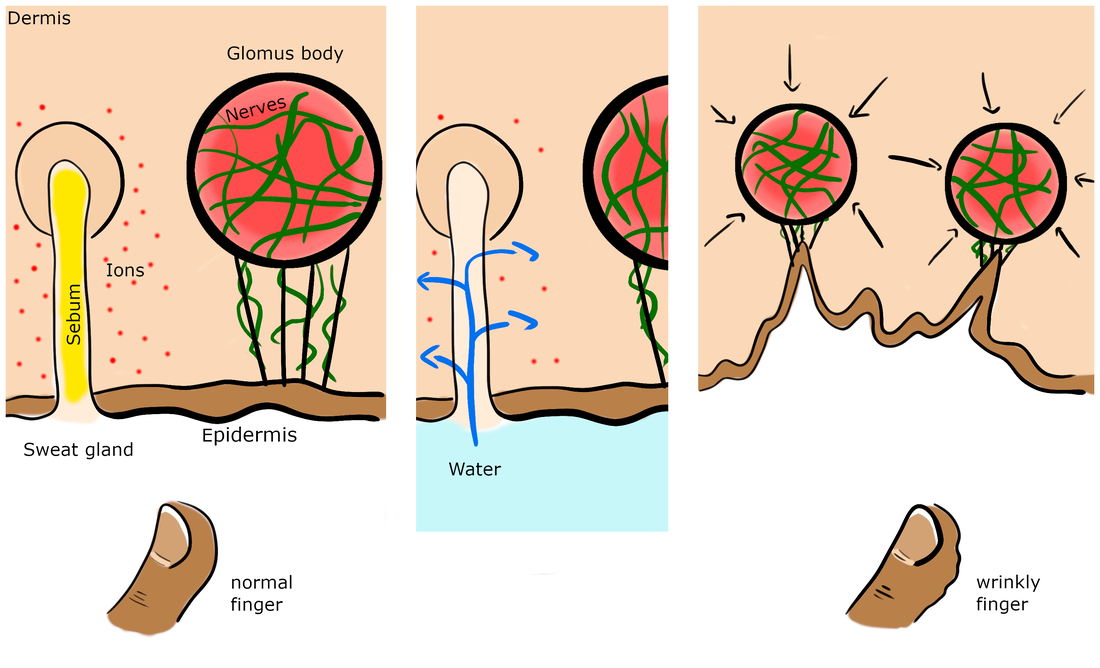Mission Cerveau Nord - BrainReach North
|
By: Sabine Rannio You have probably noticed your fingertips and toes go all wrinkly after spending some time in water. While at first, researchers believed that this was just because your skin soaks up some water like a sponge, it seems more likely that it is actually a bit more complicated and involves your autonomic nervous system. Your autonomic nervous system is a part of the nervous system that you don’t have voluntary control over (hence the name ‘autonomic’). It is split into two parts with opposing tasks: the sympathetic system, responsible for ‘fight or flight’ responses and the parasympathetic system, in charge of ‘rest and digest’. For instance, the sympathetic nervous system increases your heart rate and makes your blood vessels – the muscular tubes that transport blood through your body - expand or ‘dilate’. This increases the supply of blood and therefore oxygen and nutrients to your muscles. On the other hand, the parasympathetic nervous system decreases your heart rate and shrinks, or ‘constricts’ your blood vessels. The sympathetic nervous system also allows your lungs to take up more air, so that you are ready to fight or run away. It also stimulates your sweat glands, so that you can start sweating to cool down your body from the heat generated by your muscles. In contrast, the parasympathetic nervous system reduces air volume that can be taken up by your lungs by constricting the lungs and stimulates your digestive system. So what has this all got to do with your fingertips shrivelling up when you spend some time in water? It turns out that when your skin gets in touch with water, the outer skin layer, also called the ‘epidermis’ soaks up the water through sweat glands. This takes some time, as your sweat glands contain an oily substance called sebum that blocks water. Once the sebum is washed away, water can enter. This is why your hands and feet don’t shrivel up immediately after getting in contact with water. Water contains a different concentration of electrically charged particles, or ‘ions’ than your skin. Neuronal activity depends on the concentration of ions surrounding the excitable nerve cells, or ‘neurons’. When the concentration of ions in your inner skin layer, or ‘dermis’, changes it activates neurons that are part of the sympathetic nervous system. Activation of the sympathetic nervous system signals blood vessels to shrink, or constrict. In particular, a special type of blood vessels called ‘glomus bodies’ are attached to the outer layer of your skin. When these glomus bodies constrict, they pull parts of the skin with them, making your skin look all wrinkly. In fact, people with nerve damage in their sympathetic nervous system don’t show wrinkling of their hands and feet after spending some time in water. But is there any advantage for your hands and feet to shrivel up? While this issue is still debated, some scientists suggest that wrinkly skin gives you a better grip when in a wet environment, which may have benefited our ancestors in their search for food or escaping predators. Left: Normal skin with an outer layer, the epidermis and an inner layer, the dermis, which has a sweat gland and a glomus body that is attached to the epidermis. Middle: When your skin gets in touch with water, the sebum is washed away and water can enter through sweat glands, which changes the concentration of ions in the dermis. This activates the sympathetic nervous system (in green). Right: Sympathetic nerve activity makes glomus bodies constrict, i.e. get smaller, which pulls your skin inwards, making the skin look wrinkly (modified from Wilder-Smith, 2004)
Sources: Wilder-Smith, E., 2015. Stimulated skin wrinkling as an indicator of limb sympathetic function. Clinical Neurophysiology, 126(1), pp.10-16. (review) Changizi, M., Weber, R., Kotecha, R. and Palazzo, J., 2011. Are Wet-Induced Wrinkled Fingers Primate Rain Treads?. Brain, Behavior and Evolution, 77(4), pp.286-290.
0 Comments
Leave a Reply. |
LINKS FOR TEACHERS
AuthorLearn more about our bloggers on the "Meet Our Team" page. Archives
May 2022
Categories
All
|
|
Return to home page
|
Go to BrainReach Montreal/ Mission Cerveau
|

 RSS Feed
RSS Feed





